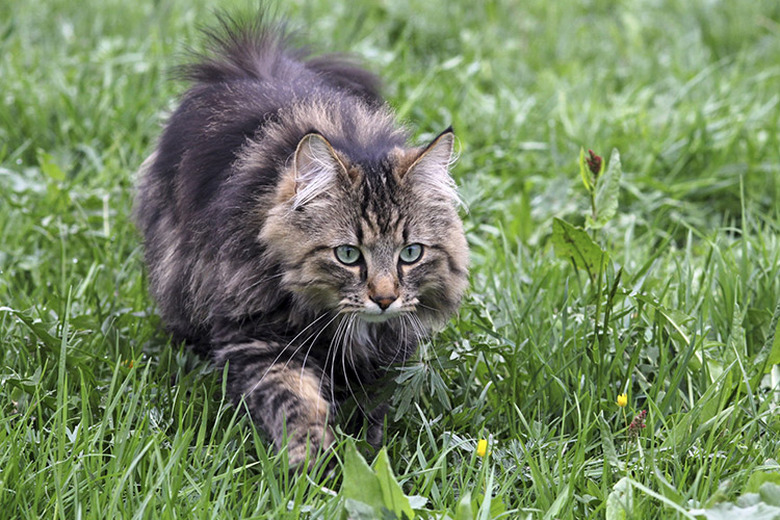Why Do Cats Torture Their Prey?
It's really difficult to comprehend how such a cute, cuddly cat could be so ruthlessly mean to torture its prey to death! All I've got to say is cut your kitty some slack. No matter how cute, cuddly and innocent your cat looks, she'll have a hard time denying her predatory instincts just to ease your conscience.
Exhausting Their Prey
A cat is a predator, a very efficient predator, which is part of the reason why cats 'toy' with their victims. If the prey is larger than the cat or is dangerous, the cat will wear out the catch until it's near exhaustion. Then the cat delivers one, quick fatal bite to sever its prey's spinal cord. So the cat is not being cruel but she is exhausting the quarry in order to safely kill it. So this is normal cat behavior. Cats do not discriminate – this is simply the manner in which they treat all prey.
Predatory Instincts
Look at it this way: Domestic cats are cats and so are Lions, Cheetahs, Pumas, Lynx's and so on. All these cats, big and small, treat their prey similarly because they're predators and hunters. This is the way of the cat and this is her predatory instinct!
Mum Knows Best
Running and chasing after their prey is instilled into the cat at birth, but the actual killing and eating of the meal is learned by mimicking their mother. A cat can be a proficient mouse killer and yet never have the desire to eat and devour it's prey if she never learned to do so from her mother, or had to out of necessity if hunting was her only means of survival. The mother cat usually brings home a kill to consume in front of her kittens for the first lesson. In time they'll learn to join in on the feast. In the next stage, mum will bring home dead prey and leave it for her kittens to devour alone. Then, next, mum will bring near dead prey home for her kittens in order for them to practice their finishing off skills. As more prey is brought home, the kittens gradually learn the art of the kill. Mum will then have the kittens accompany her where they'll learn hunting and killing on their own.
Play Makes Perfect
Chasing is healthy and natural, and although the compulsion is instilled at birth, they'll develop coordination and timing skills through playtime with their littermates. Such strategies as 'ambushing' and pouncing on their victims and capturing their prey, as well as speed adjustment are also learned as the kittens play together.
That Uncertain Feeling
Uncertainty is another reason why your cat may seem to like torturing it's quarry. If your cat feels its prey isn't a hundred percent dead, kitty may continue to toy with it to be certain it can't come back and retaliate. It's sort of a feline self-defense!
Cuddly..But Cruel?
Yes, an indoor cat that catches a mouse and tortures it may be doing it for play (and, in a way, for pleasure)—but this doesn't necessarily translate into cruelty as we humans define it. Remember that a domestic cat who's never resided outside and learned how to kill from its mother doesn't have an innate desire to kill their prey, but they are instilled at birth with the desire to chase things and play with them (in order to learn how to kill) even after their prey is mutilated or dead. So, yes, Mother Nature saw fit to give a cat a sense of "pleasure" whenever they engage in hunting and wearing out (a.k.a. toying with) their victims. It's a toy and a game to the domestic cat, and, for the wild cat, survival.
Outdoor Cats vs Indoor Cats
Prey to an outdoor or feral cat means food. No playing around or torture fits into their schedule. Once the food is killed it's then devoured with no time wasted! An indoor cat's chase of prey is most likely not hunger related at all. Prey-hunting behavior patterns between indoor and outdoor cats are like light and dark with one being out of necessity and the other, pride!
By Tom Matteo
References
The Nest: Why Do Cats Torture Mice?
Perfectpaws.com: Understanding Your Cat's Predatory Behavior
About the Author
Tom Matteo has been a freelance writer since 1992. He specializes in hardware and software reviews for computers and gaming systems, and occasionally writes about such topics as animal behavior and care. Tom resides in Bethlehem, PA with his wife Tina and his beloved cockapoo, Angel.
